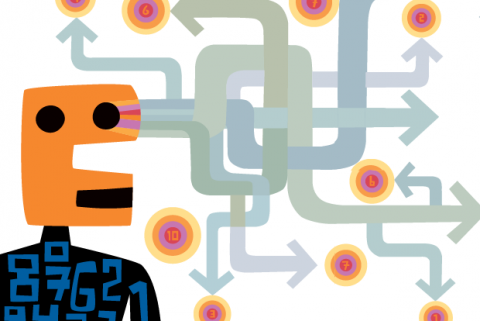An interview with Mike Dolan, CTO and co-founder of igobono, an online social marketplace where members buy, sell, and donate goods and services using social currency.
The Enterprisers Project (TEP): What were some of the challenges in being the CTO of a Web-based startup?
Dolan: It is always challenging to bring a new idea to market. In fact, one of the biggest difficulties I had to overcome in launching igobono was to define the product's scope. Since we used Agile development practices, the scope always flexed, and staying focused on our goal was a constant struggle.
Many companies try to build everything before they have users and are unsuccessful because of this reckless approach, failing to validate their concept. To stay on course, I relentlessly questioned every decision we made, asking myself if it fit into the product I had envisioned. Since I had a clear idea of what the product should look like, I remained steadfast throughout igobono's development. In my mind, everything had to fit together like one of those 1,000-piece puzzles I had assembled as a child. However, this process felt like that puzzle multiplied ten-fold; I was trying to fit 10,000 pieces together, while ensuring they all worked seamlessly to provide the best-possible user experience. In my 20-year career, it certainly was the most challenging yet rewarding achievement, requiring unflappable dedication and countless late nights over nearly a year.
TEP: For any new tech startup or product, there's always tension between getting something functional out there and including items that business executives believe are necessary to success. How do you find the balance between the two?
Dolan: I regularly met with relevant teams to discuss--and sometimes debate--features or requests, trying to build consensus if it was something I felt strongly about. Leveraging the core team's various skills was a tremendous asset and helped us navigate many bottlenecks.
My decision-making process always focuses on what is best for the user, while maximizing our current assets. Although several ideas may sound good at first, it is impossible to know for sure until you peel back the layers to understand the impact on the user experience.
TEP: You moved to Mexico to be closer to the development team. Why did you decide on this step?
Dolan: Although we would have loved to hire our coding team locally in New York City, we needed to be strategic with our resources. Therefore, we hired the number-one Ruby on Rails shop in Mexico, and, last fall, I packed up and moved there for eight months to be closer to my new team.
As you can imagine, it was daunting to move anywhere when you do not know the language or the culture, but I knew it was best for the company. Although we had an idea for igobono, the only way to help ensure that the outcome became a reality was to move down there and get into the weeds with the developers. Previously, I had project-management experience, so I was confident in my execution; I just had to deal with the added complexity of being in a different country and communicating through language differences. Developing a website reflects many disciplines, such as conceptualization, design, and user-experience knowledge, and I felt strongly that being there was critical for driving that process.
TEP: Did that strategy work?
Dolan: Challenges aside, it absolutely provided the desired effect. In fact, within a relatively short time, I was able to take the website from inception to fully functioning, while living in a foreign country. The experience was extremely difficult but the most rewarding one of my career. While in Mexico, I was able to directly influence the development as we coded, in real time. I did not have to wait for days or even hours to see completed code; I could review it as it happened, tweaking and adjusting it along the way. Since igobono was in my head, this was the most effective way to deliver my vision to the public.
After eight months, I finally returned to New York. Colima is a fascinating place to live and work. Despite being among the smallest entities in Mexico, the state has one of the highest standards of living and lowest unemployment. The talented development team we assembled continues to perform even better than expected. They are passionate coders who specialize in open source, and it is obvious why they are the top coding shop in the country. I truly embraced the opportunity, and I am thrilled with their dedication and results.
TEP: Being close to the developers also meant you were far from your co-founder and others in the business. How did you handle that distance?
Dolan: As with many industries, technology has afforded career-driven professionals the ability to work remotely. As long as there is an Internet connection, anything is possible. My co-founder Max Volsky and I have been close friends for more than 25 years, so working remotely was just an extension of our working together via a different medium. Colima was only a one-hour time difference from New York, and we used phone and video calls to stay in constant communication.
As with most businesses, we had daily and weekly calls, and members of the executive team were available when needed. After only one week, I stopped sensing the geographic distance, and we forged full-speed ahead. That said, on a personal level, not being home for U.S. holidays was difficult, but it also reinforced my focus on launching a superior website as quickly as possible.
TEP: Any advice you'd offer other startup CTOs, especially dealing with overseas development teams?
Dolan: Realize that the endeavor will be exponentially harder than you can imagine, and will require 100 percent focus and dedication. There are no quick paths to success; success happens over a sustained period of time delivering results that are immune to internal or external issues.
Steve Jobs said, "Your work is going to fill a large part of your life, and the only way to be truly satisfied is to do what you believe is great work. And the only way to do great work is to love what you do. If you haven't found it yet, keep looking. Don't settle." Always remember, the good things in life are achieved with hard work and dedication. What you spend the most time on will bear the most fruit, so be prepared for a wild, long, and exhilarating journey!




